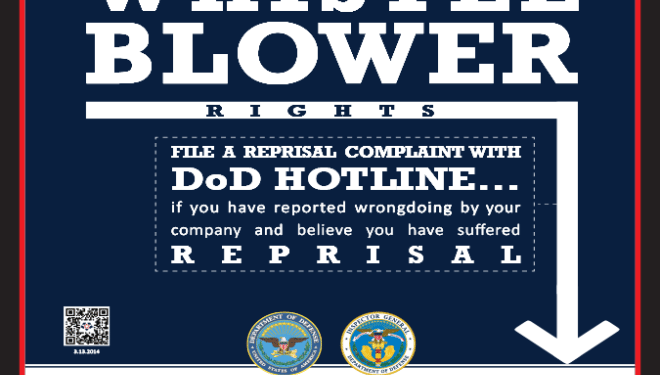The debate over whistleblower protection shifted to the impeachment trial, where another attempt was made to reveal the name of a person some think is the Ukraine Whistleblower. But, an important disclosure didn’t get much attention during the partisan sparring at this week’s House Oversight Committee hearing on whistleblower protections.
The Department of Defense is rejecting the results of its own inspector general (IG), according to Glenn Fine, the agency’s acting IG.
From Government Executive: “Recently, we’ve seen a disturbing trend of the [Defense Department] disagreeing with the results of our investigation or not taking disciplinary action in whistleblower reprisal cases without adequate or persuasive explanations,” Fine said. “Failure to take action sends a message to agency managers that reprisal will be tolerated and also to potential whistleblowers [that they] will not be protected.” He added that his office was limited in what steps it could take if management declines to act after substantiated incidents of retaliation. “We’re not judge and jury,” Fine explained. “We ought to provide transparency on when this happens, and then people ought to be asked about this. Hearings are good. Questions are good.”
A little follow-up
David Colapinto, general counsel for the National Whistleblower Center, also testified Tuesday. He sent a follow-up letter to the committee on a few points. He notes that comments suggesting that the Ukraine whistleblower is “not a real whistleblower” and, therefore, not legally protected are “reckless, flat wrong and unsupported by the Intelligence Community whistleblower protection statute, 50 U.S.C. § 3234(b).
“Every member of Congress must read the plain words of 50 U.S.C. § 3234 because it is instructive and clear on this issue. In 2014, Congress enacted this statute to expressly protect any intelligence community employee who discloses alleged wrongdoing to the Inspector General, the Intelligence Committees of Congress, or any Member of an Intelligence Committee.2It is not possible for anyone to argue that the whistleblower who triggered the impeachment process is not legally protected by 50 U.S.C. § 3234(b). This is not subject to any debate given the plain words of the statute and the facts surrounding the whistleblower’s complaint.
He also cites new data suggesting that secondhand information from whistleblowers is just as valid as first-hand information.
We note that there is no requirement in any of the federal whistleblower statutes requiring that whistleblowers provide firsthand information in order to be protected. In fact, the only requirement to obtain legal protection is that whistle blowers make a disclosure of information that the employee “reasonably believes evidences-(A) a violation of any Federal law, rule, or regulation (including with respect to evidence of another employee or contractor employee accessing or sharing classified information without authorization); or(B) gross mismanagement, a gross waste of funds, an abuse of authority, or a substantial and specific danger to public health or safety.”
A little recap
Finally, Liz Hempowicz of the Project on Government Oversight has been on Twitter talking about her back and forth with Ohio Republican Jim Jordan. She argues that motive does not matters when evaluating whether a whistleblower’s information is legitimate. Some members of Congress have called for the unmasking of the Ukraine whistleblower, who they say may be biased against the president.
Here are a few of her tweets.
Earlier this week, at a hearing on #whistleblower protections, I pointed out to @Jim_Jordan the damage to whistleblowers done by ignoring the law and painting the Ukraine whistleblower as a bad actor without any evidence. Here is a part of our exchange: pic.twitter.com/rjYOi2fNVl
— Liz Hempowicz (@lizhempowicz) January 30, 2020
Here’s a recap of our @lizhempowicz‘s oral testimony on #Whistleblower Protections & Ideas for Reform: https://t.co/I3qqSM7vy1
— Project On Government Oversight





